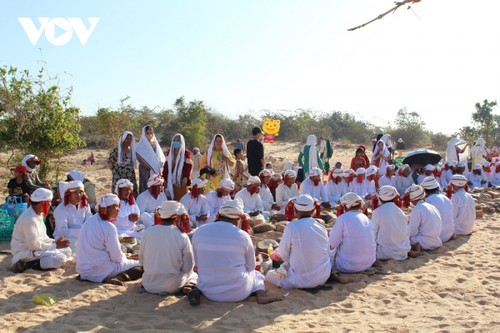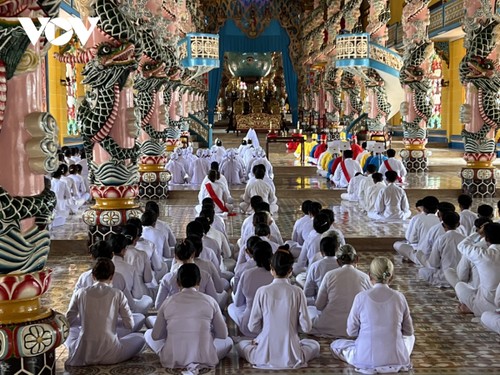 Cham Bani people in Binh Thuan province celebrate Ramuwan festival (Photo: VOV) Cham Bani people in Binh Thuan province celebrate Ramuwan festival (Photo: VOV) |
Assessments of religious freedom in Vietnam that are based on isolated cases and biased views are not accepted by Vietnam.
Assessment of Vietnam’s religious freedom needs comprehensive view
Every locality in Vietnam, even at the communal level or in a remote, island, border, or disadvantaged area, has religious establishments. There are more than 30,000 places of worship throughout Vietnam. Buddhist followers are free to worship at pagodas, temples, or monasteries. Catholics and Protestants hold services in churches and chapels every day, every week. People who follow Caodaism or are members of the Hoa Hao religious sect are free to practice their religion at worship facilities. Some of these facilities draw tens of thousands of “spiritual tourists”.
The growing number of religious followers has resulted in an increase in places of worship, training facilities, and scriptures. In 2022, there were an additional 56,000 religious followers, 810 dignitaries, and 140 worship facilities, according to the Government Committee for Religious Affairs.
Vietnam now has more than 27 million religious followers – 27% of the population. In addition to mainstream religions like Buddhism, Catholicism, Protestantism, Hoa Hao Buddhism, and Caodaism, there also many other religions, including Islam, Pure Land Buddhism, Four Debts of Gratitude, Brahman, Strange Fragrance from the Precious Mountain, Enlightened Master, and Enlightened Reason.
In Vietnam, there is no place where the government restricts or controls the expression of faith of religious people if they truly celebrate in a spirit of "good life, beautiful religion", God respect, and patriotism. But extreme religious phenomena, that go against accepted customs and traditions, or take advantage of religion to sabotage the State of the Socialist Republic of Vietnam, violate Vietnamese law.
Any assessment of religious freedom in Vietnam which is based on isolated cases or on a subjective and prejudiced view is untrustworthy.
 Caodaism followers at Cao Dai Church in Tay Ninh province (photo: VOV) Caodaism followers at Cao Dai Church in Tay Ninh province (photo: VOV) |
Freedom of religion improvement in Vietnam
On December 23, 2023, the Vatican announced that Archbishop Marek Zalewski was appointed by Pope Francis as the first permanent representative of the Holy See in Vietnam. This was the result of a series of positive exchanges in a spirit of respect, cooperation, and mutual understanding. It manifests the Vietnamese State’s consistent policy of respecting and ensuring freedom of belief and religion, creating favorable conditions for the practice of Catholicism and other religions.
The Vietnamese State has implemented multiple measures to create better conditions for millions of religious people. The National Assembly passed the Law on Belief and Religion in 2016. The Government issued decrees to implement the law. The amended Land Law which will take effect on July 1 will help solve religion-related land difficulties. So far, land use rights certificates have been granted to 70% of all religious establishments in Vietnam. The State has also created conditions for religious organizations to repair, renovate, and build religious facilities.
Major religious celebrations, such as Buddha's Birthday, the Vu Lan Buddhist festival, Christmas, Easter, the Kate festival of the Cham people, and Muslim Ramadan, are observed by large numbers of religious followers. In 2023, the Ministry of Home Affairs recognized two religious organizations – Ta Lon Debts of Gratitude and the Vietnam Full Gospel Church – and approved the establishment of the Vietnamese Baptist Theological Seminary. The Vietnamese State has now recognized 43 religious organizations.
According to the Government Committee for Religious Affairs, more than 300 religious dignitaries and monks participated in conferences, seminars, and religious training courses abroad , and 400 foreigners entered Vietnam for religious activities last year.
These religious activities and the growth of religious communities is objective evidence that there is religious freedom in Vietnam.